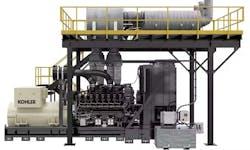The Data Center Frontier Executive Roundtable features insights from industry executives with lengthy experience in the data center industry. Here’s a look at the insights from Ryan Baumann of Kohler Power Systems
Here’s the full text of Ryan Baumann's insights from our Executive Roundtable:
Data Center Frontier: Recent earnings reports suggest the growth rate of cloud computing has moderated slightly. What’s your take on the progress of cloud computing – the “what inning are we in” question – and what lies ahead?
Ryan Baumann, Kohler: Moderating is normal, especially when growth has happened as quickly as it has within the cloud computing industry. According to a recent forecast from Gartner, worldwide end-user spending on public cloud services is forecast to grow 21.7% to total $597.3 billion in 2023, up from $491 billion in 2022. So although we may see changes in application, such as with the development of AI and the compute necessary to support it, progress is far from over and will continue to drive significant growth and usage strategies.
Additionally, any increase in reliance on cloud means more data processed which leads to even more of a need for 100% uptime.
Data Center Frontier: How would you assess the state of the data center supply chain? What items continue to experience long lead times or availability problems?
Ryan Baumann, Kohler: Meeting the demands of our data center clients is of the utmost importance. Kohler has not only made long-term capital and human resource investments towards maintaining a superior level of customer care, but has also developed an extensive SIOP methodology to ensure that all requirements of data center customers are met and projects are centered around key deliverables that guide all production activities.
Simultaneously, our team collaborates with procurement teams at some of the world’s leading engineering companies, utilizes the latest scheduling software, parts planning, and VMI (vendor managed inventory or stocking programs) programs are deployed to ensure that data center programs are delivered on time. The aim, ultimately, is to ensure that all requirements of data center customers are met, without fail, no matter the size of the project.
Data Center Frontier: Data centers have always been highly-automated facilities. What are the most promising opportunities in automation and data center management? Can AI, augmented reality, and robots play a meaningful role?
Ryan Baumann, Kohler: Across all industries, it’s important to stay open to innovations and advancements that can improve automation and efficiency. AI is no different. If implemented correctly, AI compute will continue to drive and further accelerate the needs of the data center landscape, touching a variety of aspects including improved performance, security and the optimization of configurations and deployments.
Data Center Frontier: The industry has stepped up its efforts to attract and retain talent, but staffing remains a huge challenge. What’s working well, and what more can be done to build a diverse workforce of the future.
Ryan Baumann, Kohler: Building a diverse workforce has to be both intentional and a priority. We celebrate diversity because we know that our differences are our strength - Kohler is more innovative, our teams are stronger, and we are better human beings when we nurture inclusion.
We encourage all associates to discover where they belong, whether it’s participating in a local club or group, volunteering with a social impact team or connecting with one of our Business Resource Groups. Our commitment to Diversity, Equity, and Inclusion honors our company’s heritage and amplifies our mission of Gracious Living.
About the Author




